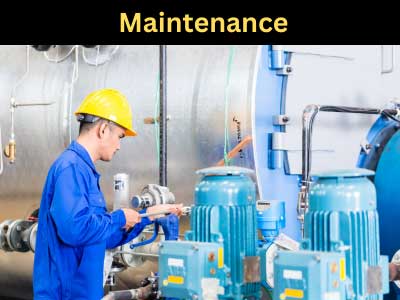Key Takeaway
Good Manufacturing Practices (GMP) in maintenance ensure that products like food, cosmetics, and pharmaceuticals are produced consistently and safely. GMP covers all aspects of production, including maintaining equipment to prevent contamination and ensure proper operation.
In maintenance, GMP requires regular inspections, documentation, and adherence to strict protocols to uphold product quality and safety. This approach minimizes risks and ensures compliance with industry regulations, maintaining high standards in manufacturing processes. Following GMP in maintenance helps prevent costly errors and ensures that equipment runs efficiently.
Defining Good Manufacturing Practices (GMP) in Maintenance
Good Manufacturing Practices (GMP) in maintenance refer to the processes and protocols established to ensure that equipment used in production is maintained at optimal levels. This includes regular inspections, preventive maintenance, and strict documentation to ensure that all equipment remains in working order and meets the required standards. The primary objective of GMP in maintenance is to ensure the reliability of equipment to avoid contamination or defects in products.
Maintenance activities must adhere to GMP guidelines that cover every aspect, from cleaning procedures to parts replacement and repair work. In the pharmaceutical or food industries, maintaining hygienic conditions is critical, and any lapse in maintenance can lead to costly recalls or damage to public health. Therefore, GMP in maintenance not only protects equipment but also ensures the safety and quality of the products manufactured.

How GMP Ensures Quality in Maintenance Operations
GMP plays a significant role in ensuring the quality of maintenance operations by emphasizing cleanliness, equipment functionality, and compliance with industry standards. By following GMP guidelines, maintenance teams ensure that the equipment functions correctly without introducing any risks that could compromise product safety or integrity. This is particularly important in regulated industries where any contamination or equipment malfunction can have far-reaching consequences.
One of the main components of GMP in maintenance is thorough documentation. All maintenance tasks, from minor adjustments to major overhauls, are recorded. This helps in tracing the history of the equipment and understanding its wear and tear over time. Moreover, regular maintenance checks, as required by GMP, ensure that equipment operates at peak efficiency, reducing the chances of unexpected breakdowns, which can halt production and delay deliveries.
Key Components of a GMP-Compliant Maintenance Program
A GMP-compliant maintenance program is built on several essential components, each designed to ensure the highest level of safety and efficiency. The first component is preventive maintenance, which includes regular inspections and servicing to detect potential issues before they result in equipment failure. Preventive maintenance helps in minimizing downtime and avoiding costly repairs while ensuring continuous production.
Another critical component is proper documentation. Maintenance records must be meticulously kept, detailing every action taken, from repairs to part replacements. This ensures traceability and transparency, making it easy to identify potential causes of equipment failures or malfunctions.
Calibration of equipment is also a vital aspect of GMP. Regular calibration ensures that machinery performs within acceptable tolerances and specifications, preventing quality issues in the final product. Furthermore, GMP in maintenance includes stringent cleaning protocols, especially for industries like pharmaceuticals, where contamination must be avoided at all costs.
The Role of GMP in Reducing Operational Risks
GMP in maintenance plays a crucial role in reducing operational risks by establishing a structured framework for maintaining equipment reliability and performance. A well-maintained machine is less likely to fail, reducing the risks of production downtime or faulty products entering the market. This is especially important in sectors such as food and pharmaceuticals, where the slightest error in the production process can lead to severe consequences for both businesses and consumers.
By ensuring that every piece of equipment is regularly checked and maintained according to GMP standards, companies can prevent unexpected equipment failures. Moreover, a GMP-compliant maintenance program minimizes risks of contamination, especially in highly sensitive manufacturing environments. Implementing proper cleaning procedures and regular maintenance checks ensures that the production area remains free from pollutants, contributing to the overall safety and quality of the products.
Industries Requiring GMP for Maintenance Standards
Certain industries are required to follow GMP guidelines strictly due to the nature of their products and the high risk of contamination or malfunction. The pharmaceutical industry is one of the most regulated sectors when it comes to GMP in maintenance. Every piece of equipment used in the manufacturing of medications must be properly maintained to avoid cross-contamination or errors in production that could affect the quality of the drugs.
Similarly, the food and beverage industry must follow GMP standards to ensure that machinery used in production does not contribute to foodborne illnesses or contamination. Cosmetics and personal care products manufacturers also follow GMP to prevent impurities from entering their products. In these industries, maintaining clean, well-functioning equipment is critical for compliance with safety standards and protecting public health.
In all these industries, non-compliance with GMP in maintenance can result in fines, production shutdowns, or product recalls, which can severely impact a company’s reputation and bottom line.
Conclusion
The importance of Good Manufacturing Practices (GMP) in maintenance cannot be overstated. By adhering to GMP standards, companies ensure that their equipment remains reliable, compliant with regulatory requirements, and capable of producing high-quality products. Implementing GMP in maintenance not only enhances the safety and quality of products but also minimizes operational risks, reduces downtime, and protects the company from potential regulatory violations.
Whether it’s in pharmaceuticals, food production, or cosmetics, GMP in maintenance is a foundational practice that guarantees operational excellence and consumer safety. By following strict protocols for maintenance, cleaning, and documentation, businesses can maintain a competitive edge and deliver products that meet the highest industry standards.
